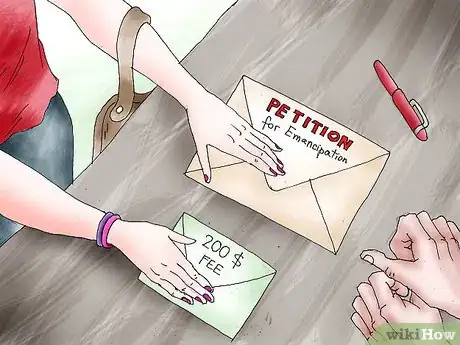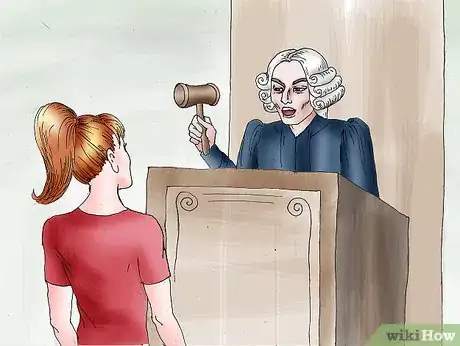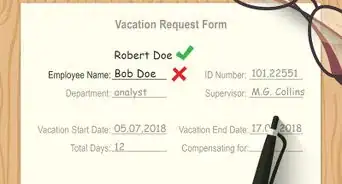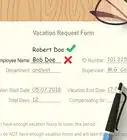wikiHow is a “wiki,” similar to Wikipedia, which means that many of our articles are co-written by multiple authors. To create this article, 66 people, some anonymous, worked to edit and improve it over time.
There are 9 references cited in this article, which can be found at the bottom of the page.
This article has been viewed 1,071,924 times.
Learn more...
Are you considering emancipation? Emancipation is a legal process that grants teenagers independence from their parents or guardians. The age at which you can become emancipated varies among jurisdictions, but it is 16 in most states. Teenagers who are emancipated have rights and responsibilities not shared by most people under 18. Read on for information on how to decide to pursue emancipation and what to expect from the process.
Steps
Deciding to Pursue Emancipation
-
1Understand what emancipation entails. When a person reaches age the age of maturity, which is the United States ranges from 18 to 21 depending on state, they become a legal adult, taking on the rights and responsibilities that come with adulthood.[1] Teenagers who are emancipated before the age of majority gain those same legal rights and responsibilities. They are no longer supported financially by their parents, and they are no longer legally required to rely on their parents to meet their needs. Consider the following rights and responsibilities you would have as an emancipated teenager:[2]
- You must find your own place to live, and be responsible for paying rent.
- You must provide your own food, clothing and other material needs.
- You may get a marriage license, driver's license, or join the armed services without your parents' permission.
- You may sign contracts without your parents' involvement, and be legally responsible for upholding them.
- You may buy and sell property.
- You may enroll in a school or college by yourself.
- You may choose what medical treatments you receive, and you are responsible for paying for them.
-
2Know what qualifies you for emancipation. Teenagers have a variety of reasons for wanting legal independence from their parents, from getting married at an early age to facing an abusive situation they want to leave. Consider pursuing emancipation if one of the following reasons applies to you:[3]
- You are legally married, and wish to have the same rights as an adult.[4]
- In this case, emancipation is achieved with parental consent and permission from the court.
- You are already financially independent, and wish to have the rights that come with financial independence.
- Your parents or guardian have told you that you cannot live with them.
- Your parents or guardian are physically or sexually abusive.
- The situation at your parents' or guardian's home is morally repugnant to you.
- Your parents or guardian have stolen your money.
Advertisement - You are legally married, and wish to have the same rights as an adult.[4]
-
3Know the alternatives to emancipation. It is not easy to take on the legal rights and responsibilities of an adult at an early age. Many teenagers don't have the resources to pay for rent, clothes and groceries without assistance, and a judge won't grant emancipation unless you show you can take care of yourself. In addition, gaining emancipation can cause a permanent rift in a family, and should only be pursued when no good alternatives exist.[5]
- Consider talking to your school counselor or a trusted adult friend about your options. He or she may be able to mediate an agreement between you and your parents that would help you feel comfortable living under their guardianship until you reach age 18.
- If you don't want to live with your parents anymore, and your reason is that you don't get along with them or you disagree with their rules, you're probably better off staying with a relative or friend for a while instead of pursuing legal emancipation.
- If you are in an abusive situation, emancipation still might not be the best choice, since emancipated individuals can no longer be aided by Child Protective Services. Contacting your state's Child Protective Services might be the option that better meets your needs.
Preparing to Become Emancipated
-
1Make your own money and manage it. When you pursue emancipation, you must prove to the courts that you are financially independent and that you have a job. If you don't yet have a job, find one as soon as possible.
- Write a resume that includes previous jobs, volunteer work, and clubs and other activities. Look in the classified section of your local newspaper for jobs that don't require a high school diploma.[6]
- Save as much of your money as you can. Don't spend money on clothes or entertainment. Buy what you do need second-hand, or try to find it for free. Grocery shop frugally; buy cheap staples like beans, cabbage and tuna. Open a savings account at your local bank.[7]
-
2Find a new home. When you pursue emancipation, you must be able to show the courts that you are living in a permanent home. You will probably not be able to afford a house; look for a small, very cheap apartment, or set up a permanent arrangement with a relative or friend.
-
3Get your parents to consent. The emancipation process is easier if your parents agree that it's the best course. If they don't, you will have to prove that they are not supporting you.
Initiating the Emancipation Process
-
1Fill out a Petition for Emancipation. In most jurisdictions, either you or your parents can file a petition for your emancipation, with or without the assistance of a lawyer. Contact the Circuit Court in your jurisdiction and ask for a petition, then fill it out along with any other forms you are required to provide, which may include the following:[8]
- An Affidavit to the petition, which is a description of your reasons for filing it.
- A financial statement describing your personal financial situation.
- A verification that you have employment, and thus will be able to pay your bills.
- A statement indicating that you have social independence.
- An Affidavit from either your parents or an adult who knows you personally and believes emancipation to be in your best interest, such as your physician, social worker, psychologist, teacher, school counselor, school administrator, or minister.
-
2File the petition and paperwork with a filing fee. When you have the paperwork filled out, return it to the Circuit Court and pay the filing fee. Filing fees vary from state to state, but are generally from $150 to $200.
- If you cannot pay the filing fee, ask for a fee waiver form from court staff.
Gaining Emancipation
-
1Attend a preliminary meeting. After your paperwork has been processed, you'll receive a date for a preliminary that you must attend, with or without a lawyer. Your parents or guardian will be given notice that they may also attend if they wish.[9]
- The court will ensure that you are able to sustain yourself financially and socially.
- Your parents or guardian will have the chance to object to your petition if they wish, and explain their reasons for doing so.
- In some cases, an investigation will be conducted. If your parents or guardian are found to be providing an acceptable home, and do not wish for you to be emancipated, your petition may be rejected.
- If the evidence presented is found to be true, your case will move forward, and a court hearing will be scheduled.
-
2Attend a court hearing. At the court hearing, you as the minor are responsible for proving that your parents either approve of emancipation or aren't supporting you, that you have the ability to manage your financial and social affairs, and that you understand your rights and responsibilities.[10]
- If you are able to provide proof that is acceptable to the Court, emancipation will be granted, and will be kept on file with the Court until you are 25.
- If you or your parents object to the decision, either to grant you emancipation or not, you may file an appeal with the Court of Appeals.
-
3Live as an adult. Once you have gained emancipation, you are responsible for living entirely without the help of other adults. You are no longer legally required to rely on your parents for assistance, so it's important to do well at your job and keep up with your bills to create a stable life on your own.
Warnings
- Emancipation gives you many rights, but not all the rights of an adult. You cannot drink, vote, or stop going to school.[11]⧼thumbs_response⧽
References
- ↑ https://definitions.uslegal.com/a/adult/
- ↑ https://ctlawhelp.org/en/a-teenagers-guide-to-emancipation
- ↑ https://ctlawhelp.org/en/a-teenagers-guide-to-emancipation
- ↑ https://www.courts.ca.gov/selfhelp-emancipation.htm
- ↑ https://ctlawhelp.org/en/a-teenagers-guide-to-emancipation
- ↑ https://bestgedclasses.org/jobs-without-diploma-or-ged/
- ↑ https://www.moneyunder30.com/how-teens-can-save-money
- ↑ https://www.usmarriagelaws.com/marriage-license/under-age-teen/marriage-age-requirements
- ↑ https://www.nolo.com/legal-encyclopedia/emancipation-of-minors-32237.html
About This Article
To get emancipated as a teen, focus on living your life independently and following the legal requirements to get emancipated. To prove your independence, find a job so you can pay for your own living expenses. Additionally, look for a place to live so you can prove that you have your own permanent address. When you feel ready to apply, fill out a petition for emancipation, which you can get from your local Circuit Court. Make sure you attach an affidavit giving your reasons for wanting to be emancipated. Once you’ve handed in the documents, attend a preliminary hearing in court when you’re requested to do so. At the hearing, you’ll need to prove that you’re self-sufficient and that your parents are not providing for you. For tips on how to decide if emancipation is a good idea, keep reading!





































































